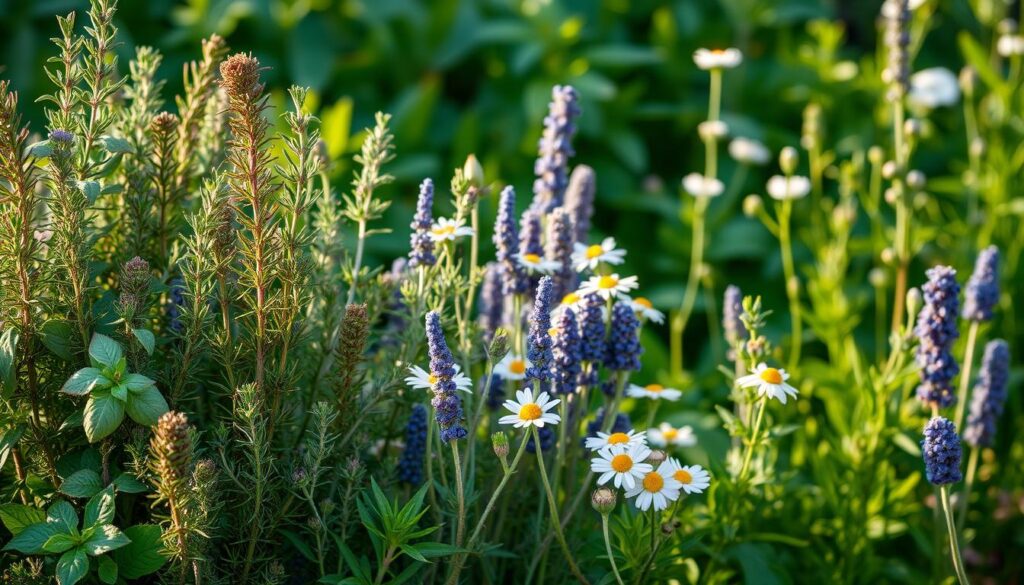Welcome to the world of herb gardening! If you love the idea of growing fresh flavors and scents at home, you’ve found the perfect guide. It’s filled with tips for beginners to make your herb garden thrive and enrich your cooking. Starting your own herb garden is easy and can make your meals taste better.
On top of that, picking your herbs adds joy and brings a peaceful green touch to your space. With these gardening tips, you’ll learn that growing herbs is not just possible but also deeply fulfilling.
Anúncios
Understanding the Basics of Herb Gardening
Herb gardening is full of rewards. It introduces various herbs with unique flavors and smells. Knowing these differences is key for both new and experienced gardeners. These plants are grown mainly for food, scent, and health benefits, unlike spices, which come from other plant parts. The essential oils in herbs give them their special traits.
What Makes Herbs Unique?
Understanding the uniqueness of herbs is the core of herb gardening. Most herbs bring a special aroma that makes food better, making them essential in many dishes. Their leaves have essential oils, giving them unique smells and tastes. This makes herbs stand out, proving their worth in cooking and healing.
Anúncios
The Benefits of Growing Your Own Herbs
Growing your own herbs offers many pluses. Home-grown herbs are fresher than those from the store, enhancing your meals. Picking your herbs can save you money, cutting down on shopping costs. Besides saving money and boosting flavors, gardening has health perks. It connects you with where your food comes from and brings joy.

Selecting the Right Location for Your Herbs
The right spot is key for your herb garden’s success. Sunlight is especially important in this choice. Most herbs love lots of sun, needing 6 to 8 hours daily. Although some herbs can handle less sun, a bright spot is best for growth.
Importance of Sunlight for Herbs
Knowing how much sun your herbs need is crucial. Basil, rosemary, and thyme love the sun. Pick a spot for your garden that gets enough sunlight for your herbs. Watch how sunlight hits your garden to find the perfect place.
Choosing Between Indoor and Outdoor Herb Gardens
Deciding on an indoor or outdoor herb garden affects your plants and gardening. Outdoor gardens let herbs grow bigger in natural light. Indoor gardens are great for year-round care, especially in cold weather. Pots make indoor gardening easier and keep herbs handy for cooking.
Choosing the Best Soil for Herb Gardening
Choosing the right soil is key for your herb garden to flourish. You should look for soil that drains well and is full of nutrients. These factors are crucial for creating the perfect environment for your herbs.
Characteristics of Well-Draining Soil
Herbs need proper drainage to stay healthy. A mix of topsoil, compost, and coarse sand is ideal. You can find coarse sand at local hardware stores. This mix simulates the natural, sandy conditions that herbs love. It also helps prevent water from staying around too much and harming the herbs.
Importance of Nutrient-Rich Soil
Adding organic compost to your soil gives your herbs the nutrition they need to grow strong. Adding in things like earthworm castings makes the soil even healthier. These steps help your herbs grow well, making your garden more productive.
How to Start Your Herb Garden from Seeds or Seedlings
Starting a herb garden is both fun and rewarding. It’s important to choose how to begin, using seeds or seedlings. Each method has special benefits. Here’s a look at the best herbs to start from seeds and why seedlings can be great.
Best Herbs to Grow from Seeds
If you’re new to this, there are some herbs that are great to start from seeds:
- Cilantro – It’s tasty and grows fast, which makes it great for beginners.
- Parsley – This herb is used in many dishes and grows pretty quickly.
- Dill – Perfect for pickling and cooking, dill is easy for beginners.
- Basil – Essential for many recipes, basil loves warm weather and is simple to grow from seeds.
These herbs sprout quickly and will be ready to use soon. They’re perfect for beginner gardeners.
Benefits of Using Seedlings
Choosing seedlings from local nurseries gives your herb garden a head start:
- Seedlings are usually stronger, giving you a better beginning.
- They adjust well to local weather, which helps them grow healthy.
- Choosing organic nurseries makes your garden more natural.
Getting seedlings means you can skip some early challenges of seeds. This way, you can grow herbs faster and add them to your dishes easily.
Essential Tools for Herb Gardening
Starting an herb garden is exciting, especially with the right tools. Having the essential tools makes gardening simpler. This means you can grow your plants more easily and efficiently. Whether you’re a beginner or looking to improve your garden, the right tools are key for success.
Must-Have Gardening Tools for Beginners
For beginners, some tools are essential in the garden. These key tools include:
- Transplant trowels for moving seedlings safely.
- Hori-hori knives perfect for digging and planting.
- Garden gloves to keep your hands safe while working.
- Garden snips for precise herb harvesting.
These tools are crucial for making gardening tasks easier. They help with efficiency and healthier plant growth.
How Tools Can Simplify Your Gardening Experience
Quality tools do more than make gardening convenient. They reduce physical effort and make gardening more enjoyable. With the right tools, you can work more precisely, improving your garden. Using these tools streamlines the process, making it easier to grow and care for your plants.
Best Herbs for Beginners to Grow
Starting a herb garden is both thrilling and fulfilling. New growers look for simple herbs that don’t need a lot of work. Many herbs do well in various places and add fresh tastes to your cooking.
Top Easy-to-Grow Herbs
Some top herbs for novices are:
- Basil: It’s known for its sweet-smelling leaves and does well in the heat and sunlight.
- Mint: Mint is tough and grows in pots or gardens, making it simple to look after.
- Chives: Offering a gentle onion taste, chives grow both inside and outside, giving a fresh touch to meals.
- Parsley: This herb is full of nutrients, easy to grow, and brings bright green color to your food.
Herbs That Thrive in Various Conditions
For those worried about their garden’s conditions, some herbs adjust well:
- Mint: It’s sturdy and can handle different light and soil, ideal for beginners.
- Chives: They need little room and do well in pots on a windowsill or in a garden outdoors.
Watering and Fertilizing Your Herb Garden
Watering and fertilizing right is key to healthy herbs. Knowing what your herbs need helps them thrive. Use consistent watering and good organic fertilizers to boost their growth and taste.
Understanding Water Requirements for Herbs
Herbs need about 1 inch of water every week, but this can change with the weather. Setting a watering schedule is important to avoid problems like root rot. Check the soil regularly to see if it’s moist.
Water your herbs well and let the soil dry a bit before the next time. This helps the roots grow strong and makes plants healthier.
Organic Fertilizers That Work Well for Herbs
Organic fertilizers are great for your herb garden. They help plants grow and are better for the earth. Try using them at half-strength or add compost to enrich the soil.
These methods keep your plants healthy without the harm of chemicals. Fertilizing regularly is safe for herbs and supports eco-friendly gardening.
Herb Gardening: Pruning and Caring for Your Plants
Caring for your herbs involves more than just watering and feeding them. Pruning plays a key part in keeping them healthy and full of leaves. By cutting your plants the right way, they’ll grow well all season.
Effective Pruning Techniques
Pruning right helps your herbs grow thick and bushy. Here’s how to do it:
- Regularly pinch the tops to make the plants fuller.
- Take off dead or yellow leaves to help air flow.
- Trim long stems to get more shoots and thick leaves.
Following these steps keeps your herb garden lively and productive.
How to Prevent Bolting in Herbs
Stopping herbs from bolting is key to keeping them tasty. Bolting makes herbs flower and seed, which makes them bitter. To prevent this:
- Prune often to boost leaf growth and reduce plant stress.
- Pick leaves often to encourage new growth and delay bolting.
Being active in stopping bolting means you’ll have tasty, fresh herbs all season.
Harvesting Your Herbs
Learning how to harvest herbs right is key to keeping their flavors strong. It helps you get the best out of your garden work. Knowing when to pick them and how to do it right can make your herbs taste better.
Best Time to Harvest for Optimal Flavor
The freshest herbs are picked right before you use them. This keeps their flavors and smells lively. Morning is the best time, after the dew has gone. Herbs are full of essential oils then, making them taste stronger.
Techniques for Proper Harvesting
Use sharp snips or scissors to harvest herbs without hurting the plant. Always cut right above a leaf node to help the plant grow back well. To keep herbs fresh, put their stems in water or wrap them in a moist paper towel and refrigerate.
Storing and Using Fresh Herbs
After you get a great herb garden going, learning to use and keep those herbs is key. Storing them right means their strong flavors stay with you for a long time. When you add them smartly to what you cook, it can really make your food sing.
Methods for Long-Term Storage of Herbs
If you want to keep your herbs fresh for a long time, there are a few ways to do it. Here are some methods:
- Drying: Hang herbs upside down in a spot that’s cool and dark. When they’re dry, put them in containers that seal tight.
- Freezing: Cut up the herbs and put them in ice cube trays. Add water or broth, then freeze. Drop them into your cooking anytime.
- Pesto: Mix herbs with nuts, olive oil, and cheese. You can freeze it or keep it in the fridge for when you need it.
- Herb-infused oils or vinegars: Mix herbs with oil or vinegar. Let it sit a few days. It adds deep flavors to your base.
Creative Ways to Use Fresh Herbs in Cooking
Adding fresh herbs to your cooking brings life and taste to your meals. Here are fun ways to use them:
- Throw fresh herbs into salads for an extra pop of flavor.
- Make sauces or dressings with herbs to boost simple meals.
- Season meats or veggies with fresh herbs before cooking them.
- Add herbs to soups and stews at the last minute for freshness.
Common Mistakes to Avoid in Herb Gardening
Herb gardening offers many rewards. Knowing common mistakes improves your chances of success. Key issues often involve watering and where you get your plants.
Overwatering and Underwatering Risks
Watering is crucial for herb health. Overwatering risks root rot, while underwatering stresses plants. It’s vital to watch for stress signs.
Adjust your watering to match the seasons and each herb’s needs. In hot periods, some herbs need more water, others less.
Choosing Plants from Reliable Sources
Healthy plants are essential for gardening success. It’s best to buy from local nurseries or farmers’ markets for stronger plants. Big box stores might sell plants with chemicals, which can slow growth. Choosing local sources gives you healthier plants and better gardening advice.
Conclusion
Wrapping up this guide on herb gardening, we see that simple steps can make it rewarding. Learning the basics—from choosing the right spot to understanding soil—is key for beginners. This shows that starting with herb gardening can be fun and fulfilling.
The recap of tips provided gives you a solid start. Growing herbs adds fresh flavors to your dishes and joy from caring for plants. This journey is full of learning and success comes with experimentation and patience.
Now, dive into the magical world of herbs. It doesn’t matter if you start with seeds or seedlings. Every plant you care for enriches your cooking. With every leaf you pick, you’ll feel more connected to the gardening process. Enjoy your adventure in herb gardening!
FAQ
What types of herbs are best for beginners?
How much sunlight do herbs need?
Can I grow herbs indoors?
How often should I water my herbs?
What kind of soil is best for growing herbs?
How can I prevent my herbs from bolting?
What are the best techniques for harvesting herbs?
How can I store fresh herbs long-term?
Why is it important to choose plants from reliable sources?
Content created with the help of Artificial Intelligence.



